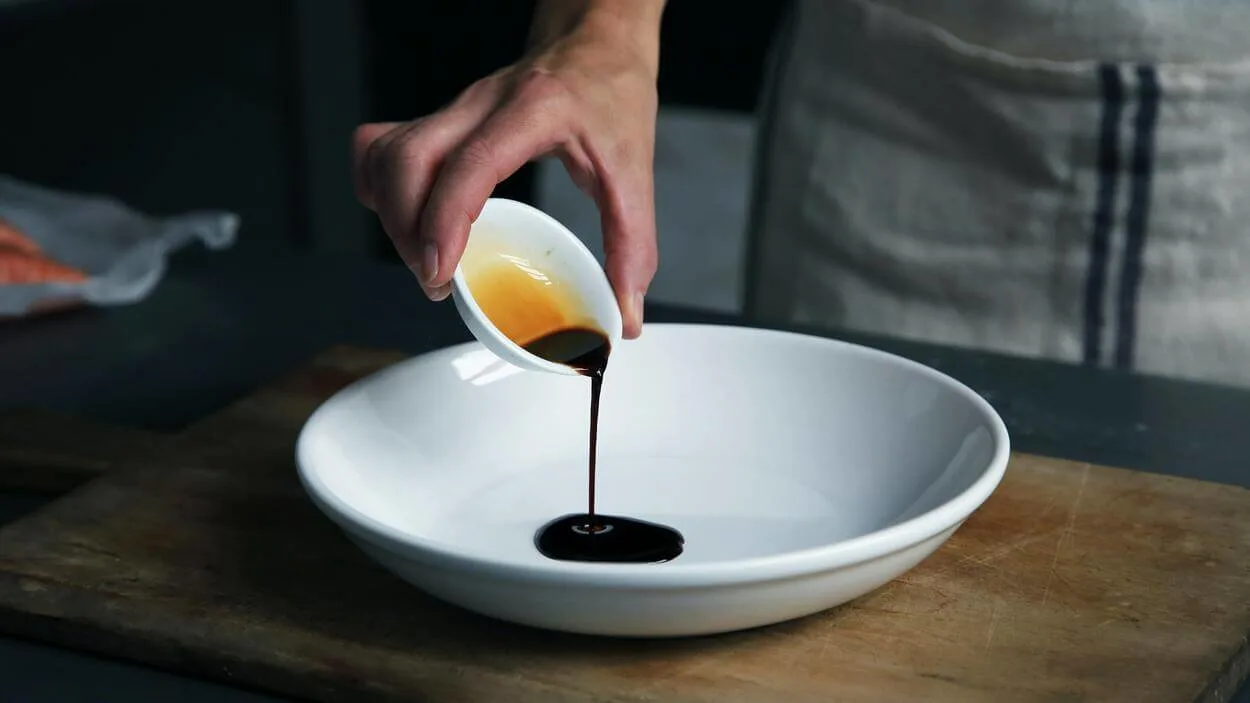White cooking wine is the usual wine, whereas white wine vinegar is a vinegar made from white wine. The main difference is that white “cooking wine” is simply white wine. It’s usually generic industrial-grade wine with salt, and sometimes herbs or other flavorings added.
On the other hand, white wine vinegar is the type of vinegar made directly from white wine. If you’re looking to become a better chef, substances like white cooking wine and white wine vinegar might confuse you.
Don’t worry, I’ve got you covered! I’ll provide a detailed account of everything you need to know about these two fantastic elements and their usage in this article.
So let’s get right to it!
What is Vinegar Made From Wine?
When one says “vinegar made from wine,” you should consider that wine is a waypoint between juice and vinegar. It’s sour, and some chefs don’t consider using it for their food as the vinegar makes it more bitter.
Moreover, white cooking wine is any white wine that isn’t intended to be used as table wine or as a dessert wine. Instead, it’s reserved only for cooking applications, such as adding it to a sauce.
This label isn’t an official term. Instead, it describes what the users intend to do with that wine. Therefore, it’s used to refer to any wine that either has some off-flavors that can be masked or just doesn’t taste great, to begin with.
In simpler terms, white wine vinegar is simply vinegar made by fermenting white wine. Or you can say it’s white wine vinegar is a white wine that has been allowed to sour. By definition, you should distinguish between wine and vinegar. However, here’s where things get tricky.
Many people choose not to drink wine because it often gets partially oxidized. So, the ethanol gets oxidized into ethanal which is acetaldehyde. Then it changes into ethanoic acid, which is acetic acid.
But wine already has ethanol, and vinegar has acetic acid! Before the wine becomes vinegar, it has a nasty smell resembling brown, green apples, and glue. That’s the smell of acetaldehyde.
This means that the cooking wine is either starting to get spoiled or has almost changed to vinegar. So, there’s usually an overlap between them.
Can I Exchange White Cooking Wine Instead for White Wine Vinegar?
Yes. If your recipe instructs you to use a dry white wine, white wine vinegar is a solid alcohol-free option.
As it’s made from white wine, it’ll have some of the intended flavors. But one should keep in mind that it’ll be much more acidic.
For example, you can replace half a cup of white wine with two tablespoons of white wine vinegar. However, because it’s too firm, it’s suggested that one should always dilute it with water. If the acidity is still not strong enough, you can squeeze a lemon.
You can use equal parts white wine vinegar plus water. For instance, if a recipe asks for half a cup of white wine, you can substitute one-fourth cup of white wine vinegar and one-fourth cup of water.
Here’s a list of possible substitutes for white wine:
- Vermouth
- White wine vinegar
- White grape juice
- Apple cider vinegar
- Ginger Ale

Are White Cooking Wine and White Vinegar The Same?
No, cooking wine made from white vinegar isn’t the same as cooking wine made from white wine. The acidity level of this product isn’t enough to make it suitable for white vinegar.
White wine vinegar is an ideal substitute for dry white wine, mainly when used to deglaze the pan. On the other hand, white wine vinegar is made using fermented white wine. Then it’s strained and bottled. It tastes kind of tangy and zingy.
While the wine vinegar has no alcohol content in it, therefore, there’s no need to burn off the alcohol you usually consume when cooking with regular wine. Additionally, the wine consists of a much subtler flavor and therefore is used in things like gravies, sauces, and many other food items.
Take a look at this table differentiating between white cooking wine and white wine vinegar:
| Categories | White Wine Vinegar | White Cooking Wine |
| Composition | Fermented white wine, sugars. | Cheaper quality white wine, grapes, calcium carbonate, Tannins, sugars, yeast, etc. |
| Flavor | Slightly acidic, mild sweetness, minimal tangy, and light sour. | Sharp and dry, mildly acidic, low sourness, and sweet, tangy undertones. |
| Usage | Brining, sauces, salad dressing. | Deglazing, enhancing flavor, tenderizing food like poultry, meat, and seafood. |
| Benefits | Diabetes- improves overall heart rate, reduces blood pressure, and enhances calcium uptake. | High in antioxidants, beneficial for slight weight loss. |
Just a bit of elaboration, white wine vinegar has gone through a second bacterial fermentation of the wine. This adds acetic acid to the original wine.
White wine, on the other hand, is a drink. It’s made by fermenting fruits and is 10 to 12 percent alcohol. White wine vinegar is a product that comes from this drink. It’s often used on salad.
You can also extract white vinegar from other fruits, like an apple. However, white wine vinegar is only made from a white grape. The juice from white grapes makes wine, and after months or years, the spoiled wine has been processed and makes white vinegar.
As far as taste is concerned, white wine vinegar is way more acidic and contains only a negligible amount or sometimes no alcohol.
What To Use if There’s No White Wine Vinegar?
If you’re out of white wine vinegar, then there are many elements that you can substitute for it. They’ll provide a somewhat similar taste to white wine vinegar and help enhance your dish through their own qualities.
- Red wine vinegar
This is considered the best substitute for white wine vinegar. It’s easy to find, and you might also already have it in your cupboard. However, it’s a bit bolder in flavor than white wine vinegar. But it’s pretty close! - Rice vinegar- not seasoned
This vinegar is made from fermented rice and is used in Asian-style cuisine. Its flavor is similar to that of white wine vinegar. However, you should not use seasoned rice vinegar as it contains sugar and salt. - Sherry vinegar
It’s medium-bodied and lightly sweet. However, it’s got a very distinct flavor that’s more prominent than white wine vinegar. It’s often used in Spanish cuisine. - Apple cider vinegar
The next best to white wine vinegar is this. It’s bolder in flavor, but it works if that’s all you have. - Lemon juice
If you’ve got no kind of vinegar, you can use lemon juice as a substitute in a pinch. As it’s also acidic and tangy, it’ll be able to provide a similar kind of flavor. Lemon juice can work for salad dressings, but you may need to add a little more if you substitute it with white wine vinegar.
Pro-tip: It’s suggested not to use balsamic vinegar or distilled white vinegar as they’re too strong!

What’s the Difference Between White Vinegar and White Wine Vinegar?
The main difference is in their flavor.
Distilled white vinegar is made out of grain alcohol mix. It usually has a solid and sharp taste. It’s most often used for pickling foods and as a cleaning agent.
On the other hand, white wine vinegar is made from white wine. Although its flavor is pungent, it’s much milder than distilled white vinegar. For savory dishes, most people often choose white wine vinegar.
Furthermore, white wine vinegar is mild and slightly fruity. It smells sweeter as compared to white vinegar.
The taste is also much less sour. This is because it’s made from fermenting white wine, which results in acetic acid.
Remember that it’s recommended not to substitute white wine vinegar for white vinegar or vice versa. Even though you can use them, their flavors are entirely different.
To substitute for white vinegar, you can use cider vinegar instead. For instance, you can substitute one tablespoon of cider vinegar for one tablespoon of white vinegar.
Take a quick look at this video explaining the uses and benefits of white vinegar:
What Are Some Uses for White Wine Vinegar?
White wine vinegar is a relatively neutral, medium acidity, and light-colored vinegar. It can be used for cleaning, pickling, and cooking.
However, it’s considered expensive to use for cleaning. It also has sugars in it. So, for both price and cleaning ability, distilled white vinegar is the best.
Sometimes, you can add a little liquid to deglaze the pan when cooking in a frying pan. White wine vinegar is perfect for that. It enhances by adding a bit of sweet and sour flavor.
It also does an excellent job of dissolving the crusty stuff. But, it’s expensive, and it isn’t typically used for applications where simply distilled vinegar would work.
It’s especially suited in vinaigrettes, specifically where other aromatics are supposed to be prevalent in the taste. It’s also used for a classic sauce hollandaise and its derivatives.
Final Thoughts
In conclusion, the main difference is that white wine vinegar is made from white wine. In comparison, white cooking wine is a type of wine.
Although they’re both interchangeable, it doesn’t mean that they have the same taste or flavor.
If you’re out of white wine vinegar, then there are many other things you can substitute it with. Examples are red wine vinegar, apple cider vinegar, lemon juice, and rice vinegar. You can also cover white cooking wine with white wine vinegar. However, using the appropriate white wine vinegar is a bit sourer.
Lastly, white vinegar is made from grain alcohol mix and has a sharp, sour flavor. And white wine vinegar is made using fermented white wine and has a fruity flavor. Cook better next time!
Other Articles
- THE DIFFERENCE BETWEEN RIGHT TWIX AND LEFT TWIX
- SNOW CRAB VS. KING CRAB VS DUNGENESS CRAB (COMPARED)
- BUDWEISER VS. BUD LIGHT (THE BEST BEER FOR YOUR BUCK!)
A web story that differentiates these can be found when you click here.

